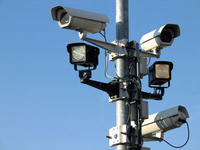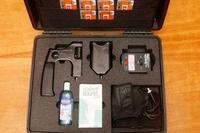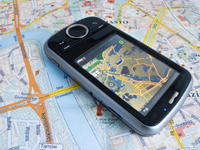-
Second NSA domestic surveillance scheme revealed: data mining from nine U.S. ISPs

A day after it was revealed that the NSA was collecting communication information on millions of Verizon’s U.S. customers, another NSA domestic surveillance scheme was exposed: the NSA and the FBI have been tapping directly into the central servers of nine leading U.S. Internet service providers for the purpose of harvesting audio, video, photographs, e-mails, documents, and connection logs. The information collected allowed intelligence analysts to track an individual’s movements and contacts over time.
-
-
Nevada lawmakers fail to restore DHS funds to Las Vegas
Members of the Nevada congressional delegation were taken aback when they found that Las Vegas would lose DHS funding for anti-terror programs, and immediately began to work their fellow lawmakers on the Hill to add money to DHS security grants to cities. The effort failed, and Las Vegas will have to find other sources of funding for some of the city’s security programs.
-
-
NSA collecting information on Verizon customers’ communications
The National Security Agency (NSA) has been collecting massive amounts of “metadata,” or transactional information, on millions of Verizon’s U.S. customers. A court granted the NSA permission to begin information collection on 25 April, stipulating the collection must end by 19 July. The court order instructs Verizon to “continue production on an ongoing daily basis thereafter for the duration of this order.” It specifies that the records to be produced include “session identifying information,” such as “originating and terminating number,” the duration of each call, telephone calling card numbers, trunk identifiers, International Mobile Subscriber Identity (IMSI) number, and “comprehensive communication routing information.”
-
-
Iowa City to ban red-light cameras, drones, license plate readers
Iowa City could become the first city in the United States to issue a sweeping ban on three law-enforcement technologies: drones, license plate readers, and red-light cameras. Privacy advocates say each of these technologies poses a threat to privacy, and the cumulative effect of using all three would turn America into a surveillance society.
-
-
Divided Supreme Court allows collection of DNA samples from suspects upon arrest
The Supreme Court on Monday, in a 5-4 decision, ruled that law enforcement is now allowed to take samples of DNA from people who have been arrested on suspicion of committing a serious crime.“Taking and analyzing a cheek swab of the arrestee’s DNA is, like fingerprinting and photographing, a legitimate police booking procedure that is reasonable under the Fourth Amendment,”Justice Anthony Kennedy wrote for the majority.
-
-
San Diego to receive $16.9 million in DHS funding
Some cities see DHS cutting its funding for their terrorism-related programs, but other cities see such funding increasing. A case in point is San Diego, which will receive $16.9 million in DHS funding to strengthen the city’s security against terrorist attacks.
-
-
Biometric technology identifies one of the Boston Marathon bombers
In a study which evaluated some of the latest in automatic facial recognition technology, researchers were able quickly to identify one of the Boston Marathon bombing suspects from law enforcement video, an experiment that demonstrated the value of such technology.
-
-
U.S. considering revamping wiretap laws
The White House is reviewing an FBI plan to overhaul surveillance laws in order to make it easier for law enforcement officials to wiretap citizens using the Internet to communicate rather than phone services.
-
-
Privacy, cost concerns check drive for more surveillance cameras

Law enforcement agencies in cities across the United States are campaigning to increase surveillance on city streets, impressed with the effectiveness of video surveillance in helping the Boston Police identify the two suspects in the Boston Marathon bombings. This campaign to expand law enforcement’s surveillance power is likely to run into stiff opposition, as Americans have proven suspicious of allowing the government powers which would infringe on privacy. Expanding surveillance networks also costs money, and these are tight budgetary times.
-
-
Preserving biological evidence
A new NIST/NIJ handbook provides forensic laboratories, law enforcement agencies, and the judicial system with state-of-the-art guidelines and recommended best practices for preserving biological evidence so that it is available at any time to solve “cold cases,” confirm the guilt of criminals or exonerate the innocent.
-
-
Kenya police: (fake) bomb detectors work, making Kenyans safer

A British businessman was convicted of selling Iraq and Afghanistan fake bomb detectors – the two countries used millions of dollars in U.S. aid money to purchase the sham devices (the devices were, in fact, $20 golf ball finders which the businessman sold for $40,000 each). The police in Kenya purchased twenty-six of the sham detectors, but Nairobi police chief says the devices work, and that Kenya is safer for them.
-
-
Smartphone app locates gunfire source

For the last decade, the Department of Defense has spent millions of dollars to develop sophisticated sniper location systems which are installed in military vehicles and require dedicated sensor arrays. Scientists have now developed a smartphone app that tracks gunfire and points in the direction the shot came from.
-
-
DHS-funded police gear blurs line between crime-fighting and war-fighting

DHS is funding the purchase of military gear by Bay Area police departments. Critics of the program say the money allocated for the war on terror is blurring the line between local law enforcement focusing on crime fighting and soldiers fighting in an enemy war zone.
-
-
Federal security grants to Kansas City cut
DHS has removed Kansas City from the list of cities receiving DHS grants, which means that the city will now have to rely on its own resources to train local law enforcement on how to predict, spot, and react to terrorist activities.
-
-
IEDs a growing threat in U.S.: security experts
Improvised explosive devices (IEDs) killed and maimed so many U.S. and coalition soldiers in Iraq and Afghanistan, that the Pentagon was forced to create the Joint Improvised Explosive Device Defeat Organization (JIEDDO).Terrorism experts say that as al Qaeda and its affiliates find it more and more difficult to engage in more spectacular terrorist attacks such as 9/11 and other attacks on aviation, they may resort to low-tech, IED-based attacks.Incendiary IEDs were already the most common weapons used in the 207 terrorist plots and attacks in the United States from 2001 to 2011. Domestic groups, led by the environmental Earth Liberation Front and Animal Liberation Front, were responsible for most of the attacks in that 10-year period. Al Qaeda was involved in four such attacks.
-
- All
- Regional
- Water
- Biometrics
- Borders/Immig
- Business
- Cybersecurity
- Detection
- Disasters
- Government
- Infrastructure
- International
- Public health
- Public Safety
- Communication interoperabillity
- Emergency services
- Emergency medical services
- Fire
- First response
- IEDs
- Law Enforcement
- Law Enforcement Technology
- Military technology
- Nonlethal weapons
- Nuclear weapons
- Personal protection equipment
- Police
- Notification /alert systems
- Situational awareness
- Weapons systems
- Sci-Tech
- Sector Reports
- Surveillance
- Transportation
Advertising & Marketing: advertise@newswirepubs.com
Editorial: editor@newswirepubs.com
General: info@newswirepubs.com
2010-2011 © News Wire Publications, LLC News Wire Publications, LLC
220 Old Country Road | Suite 200 | Mineola | New York | 11501
Permissions and Policies
Editorial: editor@newswirepubs.com
General: info@newswirepubs.com
2010-2011 © News Wire Publications, LLC News Wire Publications, LLC
220 Old Country Road | Suite 200 | Mineola | New York | 11501
Permissions and Policies
